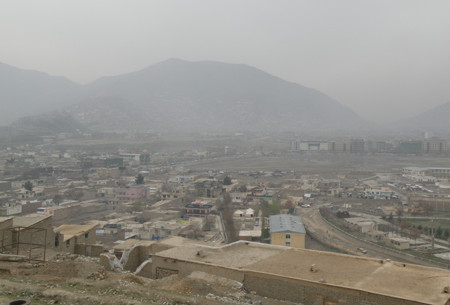By Nematullah Tanin & Hamed Kohistani
Afghanistan’s big cities face a serious environmental crisis. The National Environmental Protection Agency (NEPA) has failed to spend from its development budget. A Killid investigation in Kabul.
Last year in the Afghan capital city, NEPA officials held seven coordinating meetings with representatives of people, the municipality, ministries of public health (MoPH) and interior affairs (MoI), traffic department, and National Union of Industries. Decisions to counter environmental pollution were taken but they have remained on paper.
Head of NEPA Mustafa Zaher is frustrated by the lack of progress. “We have presented many working plans and reports to government organisations on prevention of pollution but no plans have been implemented.”
He warns Afghanistan’s big cities could become unlivable if the state of the environment continues to be neglected. The capital city faces challenging problems of air pollution and waste disposal.
Abdul Wali Modaqeq who is deputy, policy & international relations in NEPA says, “Municipalities all over the world are in charge of city services like collection and management of garbage, construction of roads and organising the markets. But in Kabul nothing much has been done by the municipality.”
NEPA officials also complain about lack of cooperation from MoPH and MoI. Its 1.4 million dollar development budget was unspent for the first six months of 2013 – one of the worst performing government departments. But NEPA officials say the Ministry of Finance (MoF) did not release the money. In defence MoF says NEPA projects were not acceptable. The blame for lack of progress in environmental protection is on NEPA.
Save Kabul River
Pollution of the capital city’s snow-fed river is a serious problem. NEPA called a coordinating meeting to discuss the matter on Sep 11 last year. Representatives from the Kabul Municipality and Ministry of Urban Development Affairs were assigned to inform major polluters about discharging untreated waste into the river. Among the violators are the luxury Kabul Serena Hotel, Ibn Sina Hospital, Maiwand Hospital, central laboratories of MoPH, and the Pol-e-Kheshti mosque.

Smog over Kabul. (Photo: Anand Gopal/IPS)
Khozhman Olomi, deputy of Kabul Municipality city services, claims the municipality has done its job. “The assigned tasks were accomplished by the municipality considering the (shortage of) personnel,” he told Killid.
He dismissed NEPA’s charge of lack of cooperation from Kabul Municipality as “propaganda”. The municipality cannot do anything more than request the Ministry of Communications and others to stop discharging untreated waste into the river, Olomi says. It is for NEPA to find a solution, he insists.
Meanwhile the head of services department in the Ministry of Communications, Shejawudin, says all the waste water is cleaned before being dumped in the Kabul River in a modern system set up by German engineers.
Garbage disposal
Kabul Municipality officials have a simple answer to the rotting mountains of garbage. The city’s rising population is to blame, they say. Afghans fleeing conflict in various parts of the country have streamed into the city seeking shelter. “The population of Kabul has increased considerably in recent years but there has been no change in the structure or services provided by Kabul Municipality,” Olomi says.
At a coordinating meeting chaired by NEPA it was decided that slaughter houses in residential areas would be shut down in the 5th and 13th districts. But the municipality has failed to stop the trade. “We have frequently shut down the slaughter houses in the Campany area but they have opened again,” says Olomi. He says the slaughter houses belong to powerful people with political connections who cannot be touched by the municipality.
Hashmatullah Stanekzai, the spokesperson of Kabul Security Commandment, says the police have helped each time the municipality has requested assistance.
Vehicular pollution
NEPA and the traffic police decided last year to ban polluting vehicles from Kabul roads. Also heavy trucks were not to be allowed inside the city. But the traffic department has failed on both scores.
Nezamudin Dadkhowah, the head of Kabul traffic, says it is not possible to take all old vehicles off the roads. Many are used as taxis, and people who own them cannot afford to buy new vehicles.
The traffic police was assigned by NEPA to install a plant in Omed township located in the west of Kabul. “The machine was purchased in 2010 but has not been installed yet due to lack of a proper place and electricity. It might not work now.”
Poor quality petrol
Head of Kabul traffic police blames the bad quality petrol sold in the country for air pollution. Oil imports are controlled by private traders. (see Killid 595, ‘Cloud over oil imports into Herat’).
The Afghanistan National Standards Authority (ANSA) claims it has planned new ways to improve the quality of oil imports. New testing laboratories have been set up in six ports: Islam Qala, Aqeena, Sherkhan Bandar, Hairatan, Nimroz and Toor Ghondai. Dr Mujeeb Rahman Khateer, the technical deputy at ANSA, says ANSA has bought a mobile laboratory to test quality of oil in Kabul. ANSA works together with NEPA to enforce environmental standards, he adds.



